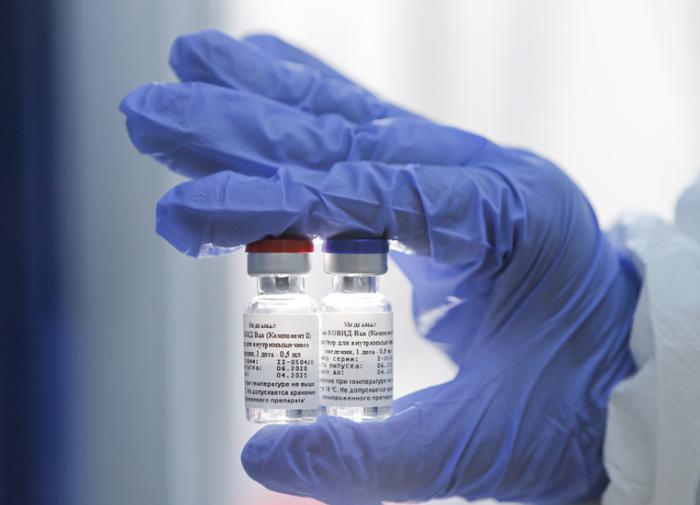Instructions for the use of the first registered Russian vaccine for the prevention of coronavirus infection, developed by the Gamaleya Scientific Research Institute, has appeared in the state register of medicines of the Russian Federation. The vaccine is called Gam-COVID-Vac, or Sputnik-V. The manual contains information about the composition of the vaccine, storage and administration conditions, as well as adverse events. According to the instructions, 38 adult volunteers, who participated in clinical trials, experienced 141 side effects.

"Gam-COVID-Vac" consists of two components and is administered intramuscularly in two stages.
- Component I contains a recombinant adenoviral vector based on human adenovirus serotype 26, which carries the gene for the SARS-CoV-2 S-virus protein.
- Component II contains a vector based on human adenovirus, serotype 5 carrying the gene for the same protein. Sucrose, two types of salt, ethanol 95%, magnesium chloride hexahydrate, polysorbate, water and chemical compound "Tris" are used as auxiliary substances.
The vaccine is injected either into the deltoid muscle of the shoulder or into vastus lateralis muscle. Component I of the drug is administered at first, while component II - three weeks later. The vaccine should be stored at freezing temperatures not higher than -18 degrees Celsius, but before use it must be kept at a room temperature until completely defrosted. The defrosted drug is stored for no longer than half an hour and must not be frozen repeatedly. After the administration of the vaccine, the patient must remain under medical supervision for 30 minutes.
According to the instructions, the vaccine has an age limit: it can only be administered to adults from 18 to 60 years old. Spokespeople for the Ministry of Health announced that documents are being prepared to obtain permission to test the drug on children.
The drug is contraindicated for pregnant and lactating women, because its effectiveness and safety have not been studied during such periods. The list of contraindications also includes hypersensitivity to vaccine components, severe allergies. In the presence of acute diseases and exacerbation of chronic diseases, the drug can be administered from two to four weeks after recovery or remission. For mild acute respiratory viral infections (ARVI) and acute infectious diseases of the gastrointestinal tract, the vaccination shall be carried out after the body temperature returns to normal.
In the event complications are observed after the introduction of the first component of the vaccine, (anaphylactic shock, severe allergic reactions, convulsive syndrome, temperature above 40 degrees), the second component of the vaccine is contraindicated.
According to the instructions, the drug should be used with caution in case of chronic liver and kidney diseases, diabetes mellitus, severe diseases of the hematopoietic system, epilepsy, strokes and other diseases of the central nervous system, cardiovascular diseases, primary and secondary immunodeficiencies, autoimmune diseases, lung diseases, asthma and chronic obstructive pulmonary disease (COPD), in patients with metabolic syndrome, allergic reactions, atopy, and eczema. Vaccination sites must be equipped with anti-shock therapy means
How Sputnik V vaccine works
Gam-COVID-Vac causes the formation of humoral and cellular immunity to SARS-CoV-2. In short, it leads to the appearance of antibodies and T-cells in the body to recognize the new coronavirus. The data is given only for antibodies: according to the published document, they were found in all participants of the trial.
The average titer (concentration) of antibodies capable to recognize the S-protein of the coronavirus amounted to 14703, and that of neutralizing antibodies was 49.3. It is still difficult to say whether this is a lot or a little: the values vary greatly for different infections. The quantities, which are enough to cope with one virus, may be powerless in front of another virus. The instructions for the vaccine say that "the protective antibody titer is currently unknown" and so is the duration of protection.
The document says that 38 volunteers aged 18 to 60 years received the vaccine. The immune systems of the subjects were assessed six weeks after the start of vaccination.
In the first couple of days after vaccination, local reactions can be expected in the area of the injection: redness, swelling, itching, fever, decreased appetite, and malaise. Other possible side effects include flu-like symptoms (chills, headache), diarrhea, oropharyngeal pain, sore throat, nasal congestion.
Russian vaccine against COVID-19 leaves many questions unanswered
It is noted that the adverse events (AEs) identified during the trials were predominantly mild to moderate and were resolved within three days after vaccination.
- Nausea, diarrhea, dyspepsia, decreased appetite, and sometimes an increase in regional lymph nodes were noted at a lesser extent.
- The instructions also provide a list of multidirectional deviations of indicators of the immunological status, such as, for example, an increase in the concentration of lymphocytes, leukocytes and platelets in the blood, as well as deviations associated with the amount of antibodies and deviations in the common clinical urine analysis.
Most of the adverse events ended without consequences (144 AEs), the instructions say. By the 42nd day of testing, the volunteers still had 31 side effects, in particular laboratory abnormalities of immunological parameters. However, this "has no clinical significance", which means that there is no need in additional diagnostics and therapy, the document says.
It is assumed that in the event of an accidental overdose, the development of toxic and allergic reactions to a more severe degree is possible. At the same time, there is no specific antidote to the drug.
The interaction of the vaccine with other medicinal drugs and its effect on the ability to drive vehicles and potentially dangerous mechanisms has not been studied.
The first batches of the Russian vaccine against the novel coronavirus will be released within the next two weeks, and it will be used immediately, Russian Minister for Healthcare, Mikhail Murashko said. The first batches will be used to vaccinate doctors and teachers. According to Murashko, a mobile application is being developed to monitor the status of the vaccinated individuals and possible adverse reactions to the vaccine.
No comments :
Post a Comment